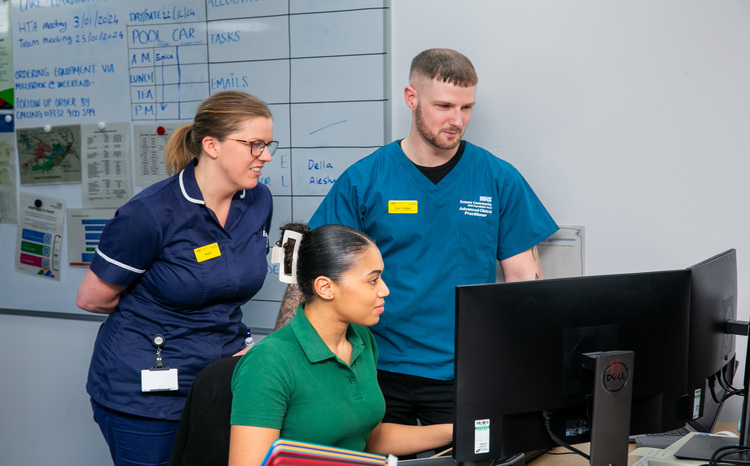Rewired 2024: Nurses need ‘an avenue of support and development for digital innovation’
- 14 December 2023

Next year’s Rewired will showcase outstanding practice in digital nursing and midwifery, but too many great ideas are never implemented. Simon Noel, a speaker at Rewired’s Digital Nursing Summit, tells Digital Health News why the NHS needs to do much more to nurture its nurse innovators
Former intensive care nurse Simon Noel (pictured, above) knows how hard it can be to take on a digital leadership position, a role he has held for the past six years as CNIO at Oxford University Hospitals NHS Foundation Trust. Writing for Digital Health earlier this year, he described the transition as “terrifying”. But he also said how much he enjoyed it.
Despite the relentless pressures on nursing and midwifery staff in the NHS, those working in digital are a noticeably engaged and enthusiastic group. Noel belongs to a highly committed team that he says is viewed within the trust as “a pivotal clinical specialist asset”. He’ll be joined at Rewired in Birmingham (12-13 March) by his Oxford colleagues, deputy CNIO Elaine Tustian and midwifery informatics lead Jennifer Mearns.
At the keynote session exploring milestones in digital nursing, he will share the platform with Professor Greta Westwood, chief executive officer of the Florence Nightingale Foundation, and Crystal Oldman, chief executive of the Queen’s Nursing Institute. Both organisations have a strong track record in the digital space, with the FNF renowned for its digital leadership programmes for aspiring leaders, and scholarships for those who wish to step up to a senior role.
The QNI has spent 10 years tracking the use of digital technology by community nurses and revealing its impact on their work and patients. In its 2023 report, Oldman writes how disappointing it is that the problems identified in 2008 are still common today, with many nurses reporting that outdated hardware and poor connections cost them time and add to their workload. Yet despite the daily frustrations, enthusiasm for digital – and a desire to fully utilise its benefits – are persistent themes in the report, and highly likely to be reflected at Rewired.
Looking forward to Rewired24, and the year ahead, Digital Health News asked Noel for his take on the big issues in digital nursing.
Digital Health: What is currently the biggest challenge for nurses and midwives in digital leadership roles?
Simon Noel: I think there are two issues here, first is the issue of consistency across digital teams. Job roles vary between organisations, and this often means the digital nurses and midwives bear the brunt in areas such as clinical safety in one setting but may not see the same accountability and inclusion in digital leadership in other organisations.
Secondly, there is the matter of team development, where a structure for essential training and team building is often less than clear.
Do nurses and midwives have enough influence on the development and implementation of digital innovations?
This depends on where you are and the access you have to the appropriate resources and support, but the nursing and midwifery voice is not very strong in this area. The majority of organisations have job roles and resources focused on delivery of digital and optimising digital clinical safety, and in these circumstances you are less likely to have a clear avenue for innovation. Staff may need to look outside of their organisation, but this in itself can be challenging.
Can you describe an innovation or development that is delivering significant benefits for patients or staff?
One solution that comes to mind is the use of handheld devices and barcoding to track blood products across the healthcare setting. The premise of primary identification of blood banks using barcode technology has allowed significant reduction in wastage of blood products, real time tracking for the availability of blood products in the clinical setting, full auditability of use and staff oversight, and the ability for staff to self-serve at satellite blood fridges. This approach has provided not just financial benefits, but also significant patient safety improvements.
Are you concerned that digital innovation will become more difficult over the next year, and if so, why?
I am not sure that the challenges will increase, but the highly pressured nature of healthcare will always be a barrier to innovation; staff are dealing with constant pressures.
A challenging environment may lead to innovation, to deal with the challenges at hand, but there still needs to be an avenue of support and development to nurture these ideas. However, many organisations cannot provide this nurturing environment. The support of industry, and research grants, may help but until there is a consistent, aligned approach to digital teams and digital resourcing, an environment where innovation is nurtured will not be easily accessible.
What are you most looking forward to at Rewired 2024?
I really enjoy the networking, getting to meet and interact with colleagues, old and new, from across the country. Whilst I have a view of how digital healthcare is working, it takes this sort of event to bring home the challenges and opportunities that are out there.
It really takes that face-to-face moment to get a feel for how we are doing and what we need to do to support others in their digital journey.
Rewired 2024 is at the Birmingham NEC, March 12-13. Find out more about the Nursing and Midwifery Summit, explore the programme, and register here.




